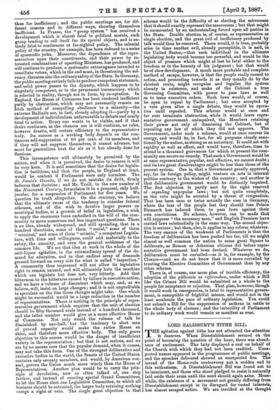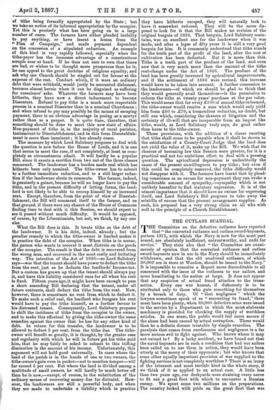LORD SALISBURY'S TITHE BILL.
rpEtE agitation against tithe has not attracted the attention 1. it deserves. When Disestablishment seemed on the point of becoming the question of the hour, there was abund- ance of excitement. The laity displayed a zeal on behalf of the Church with which they had not been credited. Unex- pected names appeared in the programmes of public meetings, and the speeches delivered showed an unexpected fire. The inroad of the Home-rule controversy put a sudden end to this enthusiasm. A Disestablishment Bill was found not to be imminent, and those who stood pledged to resist it naturally laid aside their arms until the need should again arise. Mean- while, the existence of a movement not greatly differing from Disestablishment except in its disregard for vested interests, has almost escaped notice. We are terrified at the thought of tithe being formally appropriated by the State ; but we take no notice of its informal appropriation by the occupier. Yet this is precisely what has been going on in a large number of cases. The farmers have either pleaded inability to pay anything, or have learnt a lesson from the "Plan of Campaign," and made payment dependent on the concession of a stipulated reduction. An example of this kind is very rapidly followed, especially when the tithe-payer has the immense advantage of a conscientious scruple near at hand. If he does not care to own that times are bad, or wishes to be thought more prosperous than he is, he can appeal to the great doctrine of religious equality, and ask why one Church should be singled out for favour at the expense of the rest. Conduct which, if it were an ordinary debt that were withheld, would justly be accounted dishonest, becomes almost heroic when it can be disguised as suffering for conscience' sake. Whatever the farmers may have been hitherto, they have now a direct inducement to become Dissenters. Refusal to pay tithe is a much more respectable process in a nominal Dissenter than in a nominal Churchman ; and when refusal to pay may possibly be the means of escaping payment, there is an obvious advantage in posing as a martyr rather than as a pauper. It is quite time, therefore, that something should be done to meet this new state of affairs. Non-payment of tithe is, in the majority of rural parishes, tantamount to Disestablishment, and in this form Disestablish- raent is more than imminent ; it has already come.
The measure by which Lord Salisbury proposes to deal with the question is now before the House of Lords, and it is one that seems to meet the case, if not completely, at least as com- pletely as circumstances admit. It will hardly be a popular Bill, since it exacts a sacrifice from two out of the three classes concerned. The landowner has a burden made real which has hitherto been only nominal. The tithe-owner has to submit to a further immediate reduction, and to a still larger reduc- tion if the landowner elects to commute. The farmer, indeed, is genuinely a gainer, because he will no longer have to pay the tithe, and in the present difficulty of letting farms, the land- lord is not likely to be able to recoup himself by an increased rent. Except, therefore, from the point of view of Disestab- lishment, the Bill will commend itself to the farmer, and on that ground, if there were any chance of the House of Commons finding time to deal with it this Session, we should expect to see it passed without much difficulty. It would be opposed, of course, by the Liberationists, but not, we think, by any one else.
What the Bill does is this. It treats tithe as the debt of the landowner. It in his debt, indeed, already ; but the peculiar remedy to which the tithe-owner is limited makes it in practice the debt of the occupier. When tithe is in arrear, the parson who wants to recover it must distrain on the goods of the occupier. The result is that the debt is recovered from the wrong man, and recovered in the most costly and irritating way. The intention of the Act of 1836—so Lord Salisbury says—was that the tenant should have power to deduct the tithe from the rent, just as he deducts the landlords' Income-tax. But a custom has grown up that the tenant should always pay it, and have this liability considered once for all when his rent is fixed. Fifteen years ago, it might have been enough to pass a short amending Bill declaring that the tenant, under all future contracts, shall deduct the tithe from the rent. Now, however, there is sometimes no rent from which to deduct it. To make such a relief real, the landlord who foregoes his rent would have to pay the tithe himself, as a further favour to his distressed tenant. Consequently, Lord Salisbury proposes to shift the incidence of tithe from the occupier to the owner, and to make this effectual by giving the tithe-owner the same remedies against the owner that he has for any other kind of debt. In return for this transfer, the landowner is to be allowed to deduct 5 per cent, from the tithe due. The tithe- owner will benefit so greatly, it is thought, by the greater ease and regularity with which he will in future get his tithe paid him, that he may fairly be asked to submit to this trifling diminution in the amount of his income. Unfortunately, this argument will not hold good universally. In cases where the land of the parish is in the hands of one or two owners, the tithe-owner's gain even in pocket—not to mention temper—will far exceed 5 per cent. But where the land is divided among a multitude of small owners, he will hardly be much better off than he is now,—except, of course, in the substitution of the ordinary means of recovering money due for distraint. How- ever, the landowners are still a powerful body, and when they are made to undertake a liability which in practice they have hitherto escaped, they will naturally look to have it somewhat reduced. They will be the more dis- posed to look for it that the Bill makes no revision of the original bargain of 1836. That bargain, Lord Salisbury main- tains, was an excellent one for the landowner when it was made, and after a lapse of fifty years it is still a very good bargain for him. It is commonly understood that tithe stands for the tenth part of the profit of the land, after the cost of cultivation has been deducted. But it is more than this. Tithe is a tenth part of the produce of the land, and even now that is very much more than the amount of the tithe rent-charge under the Act of 1836. The produce of the land has been greatly increased by agricultural improvements, and if the settlement of 1836 were revised, this increase would have to be taken into account. A farther concession to the landowners—of which we should be glad to think that they would generally avail themselves—is the permission to redeem the tithe at twenty years' purchase at the par value. This would mean that for every £100 of annual tithe redeemed, the tithe-owner would receive a sum which would only yield him from £60 to X70, a tremendous reduction, no doubt, but still one which, considering the chances of litigation and the certainty of ill-will that are inseparable from an impost like tithe, would, as Lord Salisbury truly says, do good rather than harm to the tithe-owner.
These provisions, with the addition of a clause enacting that tithe shall cease to be payable when it shall be shown to the satisfaction of a County-Court Judge that the land does not yield the value of it, make up the Bill. We wish that its chances of becoming law this Session were greater, for it is a practical and not too ambitious effort to deal with a pressing question. The agricultural depression is undoubtedly the cause of the present unwillingness to pay tithe ; but even if this could be completely removed, the tithe difficulty would not disappear with it. The farmers have learnt that by plead- ing conscience as an excuse for non-payment they can evoke a considerable amount of sympathy,—sympathy which is not unlikely hereafter to find statutory expression. It is of the utmost importance that it should have no excuse for expressing itself, and Lord Salisbury's Bill proposes to take away the scintilla of excuse that the present arrangement supplies. As such, his proposal has a very strong claim on all who wish well to the principle of a Church Establishment.



































 Previous page
Previous page